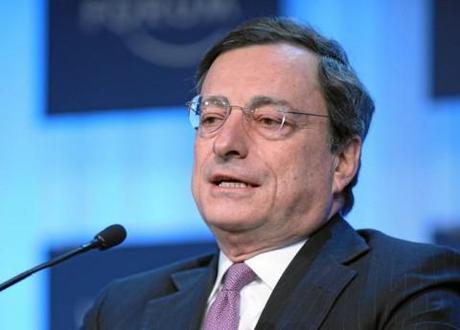 Mario Draghi, president of the European Central Bank: Poser or strongman?
Mario Draghi, president of the European Central Bank: Poser or strongman?
The background
European Central Bank President Mario Draghi is willing to use the bank’s considerable might to save the euro from what he called a “worsening crisis”: Draghi indicated Thursday that the bank would buy government bonds to help drive down borrowing costs for indebted nations such as Spain and Italy.
ECB intervention is being cast as a more forceful attempt to grapple with the deepening debt crisis in the 17-member monetary union than has previously been launched, though it was conditional – Draghi made it clear that governments must crack on with structural economic reform to win ECB aid. The ECB president also hinted that the central bank will also consider providing fresh, cheap funds for European banks, The Guardian reported, though the bank has to be cautious, the AP noted: It’s charter will not allow it to finance government’s debts. The announcement followed Draghi’s indication last week that he had a plan to save the euro – a plan that disappointed investors and markets after he revealed that it was still a work in progress.
“It’s pointless to bet against the euro,” said Draghi Thursday.
Reaction from markets to Thursday’s news was, perhaps understandably, erratic: The euro rallied against the US dollar on Thursday, only to quickly peter out, while shares rose and then fell again before the end of the day. Equity markets, meanwhile, went from positive to negative. Reaction from commentators was similarly mixed: Whilst some felt that Draghi was ready to bring out the big guns to save the euro, others felt that it was just another case of all talk and no trousers.
Draghi makes bold move
Calling Draghi’s statement a “significant step in the ECB’s interpretation of its own role”, an editorial in the Financial Times (£) declared that Draghi just made a very bold gambit in the eurozone chess match with markets and elected leaders, standing firmly with the currency. It was an adroit political manoeuver and one that puts the onus on the politicians: “By insisting that countries must go to the rescue funds first – and that the funds’ government backers must agree to support them – the central bank has made sure that governments share any credit risk the ECB may take on and, importantly, that the initiative lies with elected politicians. Both help to protect the ECB’s political independence. So does the fact that the ECB reserves the right not to act: no future rescue will be automatic.”
Draghi’s rescue ‘plan’ a predictable disappointment
Ruth Sunderland, writing at The Daily Mail, found Super Mario’s response predictably “limp”: “Surely no-one in their right mind seriously thought he was going to announce the strong policy measures needed, given the record of eurozone leaders on this score.” His “verbal incantations” aren’t the magic that the eurozone needs: “The words of a central banker should be powerful weapons, but Draghi has been firing blanks. All he has achieved in the past few days is to undermine his own credibility and that of the ECB.”
More posing from Draghi
Mary Ellen Synon, blogging at The Daily Mail, offered a pictorial opinion on the news, culling free pictures of bodybuilders from around the Internet: Draghi’s posturing will only lead to a return of the drachma and the break up of the eurozone.
Draghi needs the Bundesbank to support the bond buying
At Thursday’s press conference, Draghi also put pressure on Germany to get behind the bond buying plan in a more explicit way than he’s ever done before, and more pressure on the Bundesbank is only expected, Ed Conway at SkyNews suggested. “The big question is no longer whether the ECB can and would carry out dramatic action to shore up the struggling parts of the euro but whether it can achieve the support from within necessary for that to take place.”
More on the eurozone crisis
- Spain bailout terms agreed
- Germany won’t commit on bonds
- Greeks vote ‘pro-austerity’

